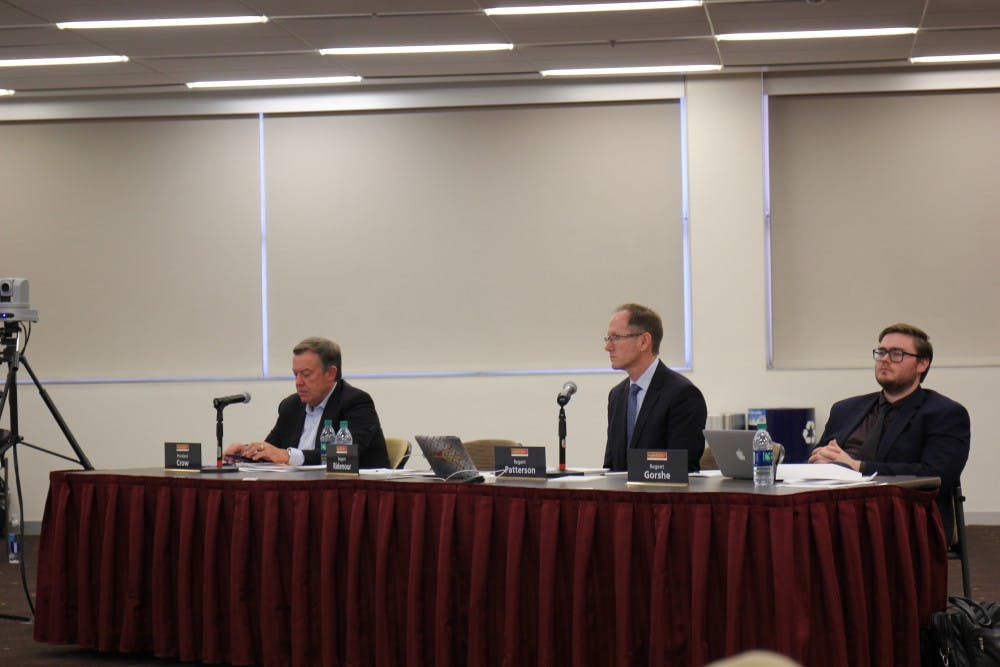The Arizona Board of Regents held a public hearing about ASU 2017-18 tuition proposals on Tuesday in the Memorial Union at the ASU Tempe campus.
President Michael Crow reiterated his proposal for tuition increase to students and faculty as well as three board members of ABOR: Bill Ridenour, Greg Patterson and Jared Gorshe. The event was also broadcast live to the other four ASU campuses.
Crow’s proposal includes a 1.5 percent increase for resident students, a 3.5 percent increase for out-of-state students and a 4.5 percent increase for international students, according to the proposal's official webpage.
The board will decide on the official percentage increases on April 6. If the proposal is approved by ABOR, ASU would still have the lowest in-state tuition across state universities at $10,792 for the 2017-18 academic year.
“All of your views are welcome, and all of your views affect how we think about what it is that we’re doing and where we’re headed,” Crow said.
Crow said ASU’s population displays more socioeconomic diversity than before.
“We have a much broader student body and a larger student body both based on ethnicity and family income,” he said.
Crow also said ASU’s performance and reputation has advanced while keeping the institution inclusive to people of various backgrounds.
Ira Sanchez, a junior studying social work, said ASU still has many deficiencies when it comes to affordability.
“In 2008, I was a senior in high school,” he said. “I was homeless. My parents kicked me out when I graduated. This is the first time that I’ve had three nutritionally dense meals a day in ten years, and it’s because of the resources that are available at ASU.”
Sanchez said that when the dining halls closed over spring break, he remembered what it was like to be hungry.
“So with that, for you, (students) might just be numbers, for you it’s the constitution, for you it’s policy, for you it’s politics, but for students in poverty, it’s our lives,” he said. “It’s whether or not we eat. It’s whether or not we have housing.”
Sanchez said the Student Advocacy Office helped him with his living situation, enabling him to stay at the University and pursue his passion for academia.
“I want to do anything that I can to stay here, obviously within legal means, but I’m here to stay,” he said. “I want other students who are like me to have that opportunity as well.”
Sanchez said Michael Crow made an unnecessary amount of money in 2015.
“If he took a pay cut, I would not be homeless for years," he said. "That’s not on the proposal’s list, is it? It’s not. I wonder why. Because it’s slightly uncomfortable to talk about it.”
Fallon Leyba, the chair for Students of a Democratic Society at ASU, presented her concerns about the tuition increases. Leyba and her organization have been actively opposing the tuition hikes for several months.
“We would like to extend our concern for tuition hikes across the state, the tuition hikes that are going to be occurring at NAU and at the U of A and here on the ASU campus,” she said.
Leyba said she was disappointed by the turnout of the meeting because it wasn’t well advertised and many students who are affected by the tuition hikes were not present.
Noah Briggs, a senior studying economics and philosophy and a member of SDS, shared the same sentiment, and said that no actual solutions were given to multiple student concerns.
However, some student speakers at ASU expressed gratitude for the proposed increase in tuition because of the programs and opportunities that were improved because of the revenue from previous tuition increases.
Andrew Waldron, a graduate teaching associate, said he is grateful for the balance of increases between undergraduate and undergraduate students.
“I appreciate that tuition increases are the same for undergraduate and graduate students,” he said. “I am pleased ASU is treating these groups of students the same.”
Reach the reporter at anbuechl@asu.edu or follow @alexa_buechler on Twitter.
Like The State Press on Facebook and follow @statepress on Twitter.




